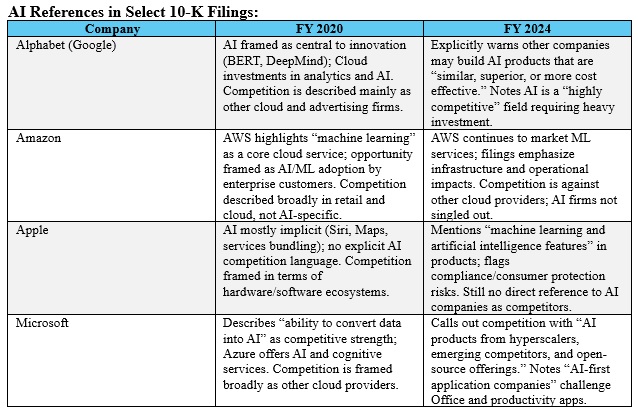PRINT AS PDF
In the past four years, artificial intelligence has shifted from a buzzword in company filings to a full-blown competitive battleground. A review of 10-K reports from Apple, Amazon, Google, and Microsoft for FY 2020 and FY 2024 reveals that the tech giants now treat AI as an increasingly central force shaping opportunities, risks, and rivalries.
Back in 2020, AI barely registered in filings from Apple and Amazon. Apple’s mentions were confined to consumer features such as Siri or Maps, tucked into service bundles without a broader AI narrative. Amazon, too, relegated machine learning to the AWS product catalog, describing it as one service among many. Google and Microsoft were exceptions. Both spotlighted machine learning as powering their most advanced innovations. Google cited BERT and DeepMind breakthroughs. Microsoft described Windows and Cortana as “AI-first interfaces” while tying Azure to AI and cognitive services.
By 2024, the tone had shifted dramatically. Google and Microsoft now describe AI as an organizing principle across their businesses. Google positions Gemini, its flagship AI system, as foundational to search, advertising, Workspace, and Cloud. Microsoft, meanwhile, pitches Azure AI, custom silicon, and new “agentic” platforms as part of a stack spanning enterprise software, LinkedIn, and developer tools. Apple updated its filings to acknowledge expanding AI and machine learning features, even as it framed them largely in terms of compliance and consumer protection risks. Amazon stuck to its playbook, highlighting AI within AWS infrastructure and cloud services rather than across the company.
The companies’ description of competition revealed an even sharper divide. Microsoft warned that its AI offerings face direct competition from hyperscalers, emerging rivals, and open-source communities. It even cited “AI-first application companies” as threats to its productivity software. Google echoed these sentiments, cautioning that rivals may produce AI products that are “similar, superior, or more cost-effective” to its own. In contrast, Apple and Amazon did not identify AI companies as competitors. Their posture suggested that they still view AI more as an enabling feature than a contested market.
The companies’ risk disclosures have evolved just as quickly. Google and Microsoft dedicated extensive sections to AI-specific hazards, from harmful content and discrimination to regulatory liability. Apple highlighted risks linked to consumer protection and compliance, while Amazon cast AI largely as an operational scaling issue tied to infrastructure. The filings suggest that legal, ethical, and reputational risks tied to AI adoption are now considered Board-level concerns.
A quick SWOT analysis based on the companies’ 10-K filings provided insight into each company’s approach. Microsoft’s strength lies in its full-stack integration, but its reliance on partners like OpenAI creates risk exposure. Google’s AI-first strategy promises monetization across search, ads, and cloud, though regulatory scrutiny looms. Amazon offers AI infrastructure at scale, yet risks ceding public awareness in consumer AI to competitors. Apple has the brand and ecosystem to deliver on-device, privacy-centric AI, but risks falling behind in foundational research.
All said, as often happens in the early stages following the introduction of transformational innovations, some of the leading high-tech firms have differing perceptions of AI and are taking differing approaches on how they respond to its rapid rise and evolution. How these companies and others, including start-ups and future start-ups, pursue AI could redraw the competitive global technology landscape.



